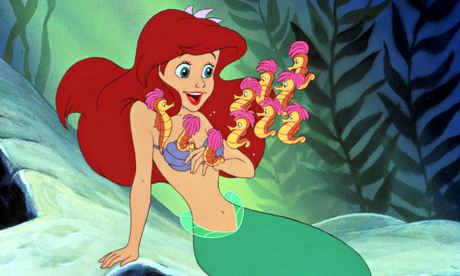
As a proud Person of the Ocean (PotO) – please don't refer to me as merman, that's so politically incorrect – I am deeply passionate about being represented in children's (and indeed adult) fiction. You can roll your eyes and call me a whiny leftie all you want, but this is something I had to grow up with.
As a young person, growing up in the North Sea was tough. There were very few PotO for me to socialise with, so you can imagine I felt like something of an outsider, a freak. For the longest time, I truly thought I might be the only one. I was isolated, I was lonely.
It was only when I moved into the Atlantic for Aquatic University that I even realised there were other people like me – hundreds and hundreds in fact – but by that time a lot of damage had been done. I'd spent twenty years feeling abnormal. That's hard to get over, and I think it still affects me now.
As a fully-grown PotO, I am now hugely proud of my glistening scales and ability to breathe underwater, but I can't help but think life could have been so much easier had I had some early role-models in books. Like legged humans, I grew up on Point Horrors, Sweet Valley High, Doctor Who paperbacks and Babysitter's Club. You'll note that none of these books feature PotO characters. Those that did portrayed us in a very stereotypical fashion.
This is about fair representation of a minority group. PotO aren't bad people; we aren't deviants; we aren't trying to drown sailors with our mystical powers. Stories which add to myths about my people are worse than no stories at all.
Sadder still, after The Little Mermaid came out in 1989 (yikes, that makes me feel old) a lot of people seemed to think our story had been sufficiently covered forever. "No we don't need any more books about mermaids," publishing people said, "it's been DONE." Well I don't think Ariel's experience speaks for us all. To suggest that all PotO sit around all day singing and wearing seashells is deeply oceanophobic.
Ocean People are exactly the same as Land People. We have a range of jobs, hobbies and interests. Where we are featured in literature, PotO tend to be characteristically the same – we're often the best friend or a love interest for a human character. So rarely are we main characters, and so rarely are stories told through our eyes.
I sometimes wonder if authors and filmmakers are scared to write about us. Is it that they think our stories won't appeal to the majority group? Well, that's depressing. Or is it that they feel they can't understand my experience? We're not aliens! We're exactly the same as you except for one tiny aspect. As a PotO, I'm expected to understand what it's like to be a human or simply have nothing to read.
By now, you've hopefully worked out where this is going. As it's The Guardian children's books site's LGBT week I was asked to write something as both a member of the LGBT community and as an author whose novels feature LGBT characters. I dearly wish I was a merman, but alas I am just a gay man. The things I've just written may seem absurd when featuring mermaids, but this was very much my reality growing up in a small town in the north.
I was unaware gay people even existed and, when puberty hit, found myself more than a little lost. I so dearly wish there had been just one book with a character who was a bit like me – just a normal teenage guy who happened to be gay. I would have especially loved one whose sexuality did not define him.
Teenage readers now are comparatively lucky in that they do have role models in books by not only myself, but also much more famous authors like David Levithan, Patrick Ness and Cassandra Clare.
I'm my books, I choose to write human characters and start with the similarities before looking at the differences. We all love, hate, kiss and fight in the same way. We're all driven by the same variety of hungers. We all laugh, we all cry.
I just know that had there been a diverse range of people like me in books when I was growing up, I wouldn't have felt abnormal for all those years, which I see now, overwhelmingly, I am not. In 2014, it's my hope that all young LGBT people can see themselves in fiction and recognise there is a place for them in the world.
James Dawson, The Sea

